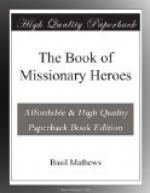“Wake: the silver dusk returning
Up the beach of darkness brims,
And the ship of sunrise burning
Strands upon the eastern rims.”
II
Thrown up by the ocean in the darkness like driftwood, Elikana and his companions lay on the grey shore. Against the dim light of the stars and beyond the beach of darkness they could see the fronds of the palms waving. The five survivors were starving, and the green cocoa-nuts hung above them, filled with food and drink. But their bodies, broken and tormented as they were by hunger and the battering breakers, refused even to rise and climb for the food that meant life. So they lay there, as though dead.
* * * * *
Over the ridge of the beach came a man. His pale copper skin shone in the fresh sunlight of the morning. His quick black eyes were caught by the sight of torn clothing hanging on a bush. Moving swiftly down the beach of pounded coral, he saw a man lying with arms thrown out, face downward. Turning the body over Faivaatala[31] found that the man was dead. Taking the body in his arms he staggered with it up the beach, and placed it under the shade of the trees. Returning he found the living five. Their gaunt bodies and the broken craft on the shore told him without words the story of their long drifting over the wilderness of the waters.
Without stopping to waste words in empty sympathy with starving men, Faivaatala ran to the nearest cocoa-nut tree and, climbing it, threw down luscious nuts. Those below quickly knocked off the tops, drank deep draughts of the cool milk and then ate. Coming down again, Faivaatala kindled a fire and soon had some fish grilling for these strange wanderers thrown up on the tiny islet.
They had no time to thank him before he ran off and swiftly paddled to Motutala, the island where he lived, to tell the story of these strange castaways. He came back with other helpers in canoes, and the five getting aboard were swiftly paddled to Motutala.
As the canoes skimmed over the surface of the great lagoon Elikana and his friends could see, spread out in a great semi-circle that stretched to the horizon, the long low coral islets crowned with palms which form part of the Ellice Islands.
The islanders, men, women, and children, ran down the beach to see the newcomers and soon had set apart huts for them and made them welcome. Elikana gathered them round him, and began to tell them about the love of Jesus and the protecting care of God the Father. It all seemed strange to them, but quickly they learned from him, and he began to teach them and their children. This went on for four months, till one day Elikana said: “I must go away and learn more so that I can teach you more.”
But they had become so fond of Elikana that they said: “No, you must not leave us,” and it was only when he promised to come back with another teacher to help him, that they could bring themselves to part with him. So when a ship came to the island to trade in cocoa-nuts Elikana went aboard and sailed to Samoa to the London Missionary Society’s training college there at Malua.




